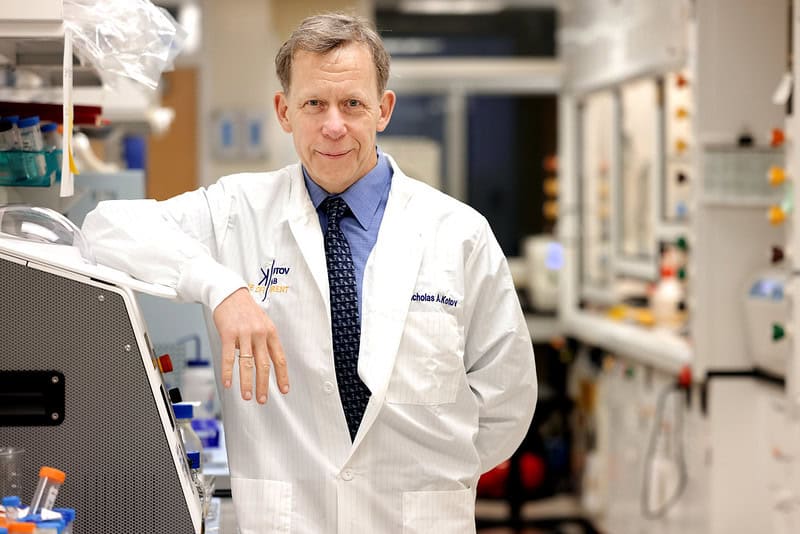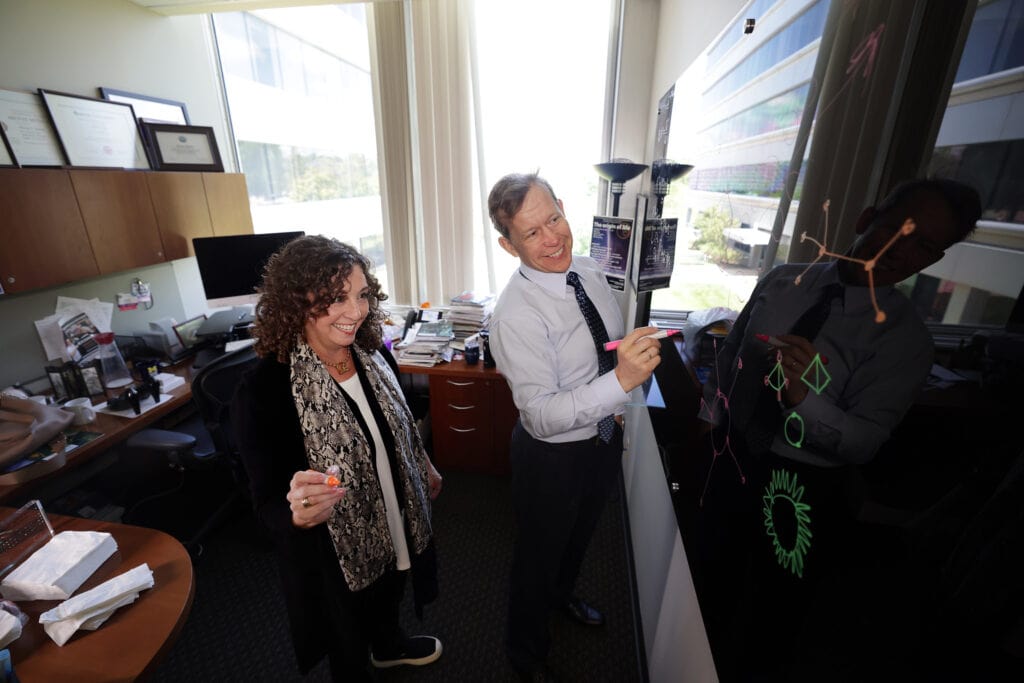
Nicholas Kotov receives Royal Society of Chemistry Centenary Prize
The award recognizes his innovation in the field of self-assembling nanosystems and excellence in scientific communication.

The award recognizes his innovation in the field of self-assembling nanosystems and excellence in scientific communication.
Nicholas Kotov, Joseph B. and Florence V. Cejka Professor of Chemical Engineering has been awarded the Royal Society of Chemistry’s (RSC) Centenary Prize. This award recognizes his research and innovation in the field of self-assembling nanosystems and his excellence in scientific communication.
“I am most grateful to the Royal Society of Chemistry for this great honor. It is a humbling experience and another realization that some ideas have a difficult path to broad acceptance,” Kotov said. “By and large, imperfections in particles – just like imperfections in people – should be treated as assets. The imperfect nanoscale particles are the source of amazing complexity and lead to widely utilized materials.”
“I am most grateful to the Royal Society of Chemistry for this great honor. It is a humbling experience and another realization that some ideas have a difficult path to broad acceptance. By and large, imperfections in particles – just like imperfections in people – should be treated as assets. The imperfect nanoscale particles are the source of amazing complexity and lead to widely utilized materials.”
Nicholas KotovJoseph B. and Florence V. Cejka Professor of Chemical Engineering
Celebrating pioneering research in nanomaterials
Throughout his career, Kotov has made significant contributions to understanding and applying the principles of self-assembly in nanomaterials. His work demonstrates that small, randomly shaped nanomaterials can self-assemble into functional materials regardless of their initial shape and size. Contrary to conventional knowledge, these imperfectly shaped nanostructures enhance the self-assembly process, resulting in nanocomposites with superior strength and conductivity. These advanced materials mimic the structural complexity of biological materials like bone, shells and cartilage.
Applications of Kotov’s research span environmental technologies, healthcare, energy solutions and green chemistry. The socioeconomic impact of these nanocomposites has been estimated at $19 billion for the period from 2019 to 2022, according to reports by BCC Publishing.
Kotov also is the director of the Center for Complex Particle Systems (COMPASS), a National Science Foundation funded center that develops and practices a systems-level approach to particle-based matter for energy-efficient manufacturing. Recent research from the center found a new material that can twist light at 250 degrees Celsius, and through the imaging of turbulence in aircraft engines and other applications, it could enable aerospace engineers to improve designs for better aircraft flight performance. Beyond aircraft design, the new material and manufacturing method could enable new classes of materials to be used in polarization optics. Other recent work from Kotov includes a study of complex chiral particles designed to inactivate multiple strains of the SARS-CoV-2 virus that could one day complement existing treatments for COVID-19 and a new 3D printing process for helical metal nanoparticles to provide a simpler way to produce a material essential for biomedical and optical devices.

Kotov has been nationally and globally recognized with honors including the Chirality Medal, Nanoscale Science and Engineering Forum Award from the American Institute of Chemical Engineers and the David Turnbull Lectureship from Materials Research Society. Earlier this year, he was named a fellow of the American Association for the Advancement of Science, in 2022 he was elected to the American Academy of Arts and Sciences and in 2020 he was inducted into the National Academy of Inventors for practical implementations of biomimetic nanocomposites. He has founded several startups that commercialize self-assembled nanostructures for energy, healthcare and automotive industries and is a committed advocate of scientists with disabilities.
Acknowledging excellence in chemical sciences
The Royal Society of Chemistry’s prizes have been acknowledging outstanding contributions to the chemical sciences for over 150 years. The Centenary Prize joins a distinguished list of awards that honor remarkable achievements across various disciplines and career stages in chemistry. Notably, 60 past recipients of the RSC’s awards have gone on to win Nobel Prizes, underscoring the significant impact and recognition of these honors.
“The chemical sciences cover a rich and diverse collection of disciplines, from fundamental understanding of materials and the living world to applications in medicine, sustainability, technology and more. By working together across borders and disciplines, chemists are finding solutions to some of the world’s most pressing challenges,” said Helen Pain, Chief Executive of the Royal Society of Chemistry. “Our prize winners come from a vast array of backgrounds, all contributing in different ways to our knowledge-base and bringing fresh ideas and innovations. We recognize chemical scientists from every career stage and every role type, including those who contribute to the RSC’s work as volunteers. We celebrate winners from both industry and academia, as well as individuals, teams, and the science itself.”
“The chemical sciences cover a rich and diverse collection of disciplines, from fundamental understanding of materials and the living world to applications in medicine, sustainability, technology and more. By working together across borders and disciplines, chemists are finding solutions to some of the world’s most pressing challenges.”
Helen PainChief Executive of the Royal Society of Chemistry
About the Royal Society of Chemistry
The Royal Society of Chemistry is an international organization dedicated to advancing the chemical sciences. Founded in 1841 and based in London, it boasts a global membership of over 50,000. The RSC leverages the surplus from its publishing and knowledge business to support thousands of chemical scientists in making vital advancements in chemical knowledge. Through professional development, advocacy and community engagement, the RSC fosters innovation and collaboration in the field of chemistry.